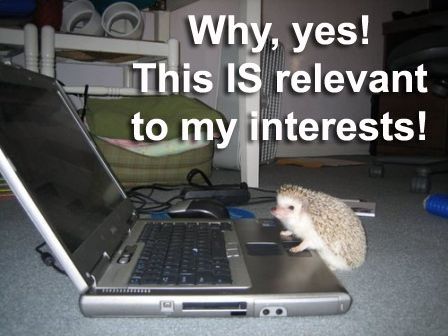
My attendance at AAUP this year was cut short because of a family obligation back home, but in the time I was there, I got to talk to a number of people, all laboring conscientiously for their respective organizations and all of whom believe that their work is important, financial constraints notwithstanding. Perhaps it is a function of seeing so many familiar faces (why is it that people persist in getting older?), but I came away with the feeling that we are in the midst of a prolonged moral rumination. Note that I do not use the phrase “existential crisis.” The presses will be with us longer than the people working for them; existence is not at issue. But centrality is a different matter. How does the business of university press publishing remain relevant today, when so many forces seem to be moving in a different, though not always opposing, direction?
To the author who successfully landed a contract with a university press, watched eagerly as the first notices began to appear, and then went before an academic committee, who cited the book in the granting of tenure, the issue of relevance must seem bizarre. But not so, or not always so, in the cramped offices of the publishers themselves. While we can find exceptions to virtually any rule (I am taking bets on a specific individual appearing shortly in the comments section of this blog), many press people feel that they have been neglected by their institutions and sometimes the world beyond that. The administration may fail to mete out essential financial support, and in a few instances that I have observed, seems to want to will their presses away by placing them in wholly inadequate office space often far from campus–all this while capital campaigns go forth to build more facilities for the scientific disciplines.
Meanwhile the marketplace has not become friendlier, as libraries buy fewer books, at least from university presses, and many that they do buy are steeply discounted aggregations and cut-rate short-term rentals. (I learned this week that some libraries have had the audacity to put records for demand-driven acquisition titles into WorldCat, making it seem that the libraries owns books that in fact they don’t.) Adding insult to injury, some libraries have established their own publishing programs, which are typically not held accountable to the market-based requirements that administrations impose on presses. Outside the academy the yahoos of the political class denigrate humanities education, where university presses provide the principal credentialing function. (University presses collectively publish about 5,000 monographs a year, 80% of which are in the humanities.) Some readers of this blog know many people with advanced degrees in the sciences who have not been able to obtain jobs in their fields, but, yes, we do have to reform education in the U.S. Let’s start with the legislature.
That’s the case for irrelevance: diminished financial support, a declining market for press products, new competition within a press’s own institution, and cultural resistance to the very disciplines that university press publishing does so much to support. But the question–How do we remain relevant?–is not a rhetorical one. The presses in a variety of ways are seeking to answer it. The responses fall into a number of groups, which are not always mutually exclusive:
- The case for realism. Some press directors see their role as learning to operate in a world of diminished expectations. The monograph market is not coming back, this argument goes, and it is necessary for a press to reduce its cost structure in order to continue to publish the specialized titles that scholars require. The strength of this position is that it acknowledges the marketplace reality; the negative here is that it is essentially a strategy built on preserving past practices, albeit in a reduced form. The problem with realism is that it all depends on how you look at it.
- Embrace open publishing. With open access publishing flourishing in the STM journals world, where few presses participate, the possibility of extending these models to the university press world is on many people’s minds. OA services for both books and journals are now part of the program for several presses. The question is will these new offerings be successful and what to do about the many new competitors springing up among the commercial houses?
- Initiate new programs and services. Even beyond the emerging OA services, new programs in various areas are cropping up. One of the more interesting conversations I had was about finding a strategy for university presses to become more prominent in journal publishing. Another publisher is investigating the tools business (software that adds value to scholarly material). The thinking here is that while the traditional monograph may be under pressure, there are other activities where presses can make a meaningful contribution to scholarly communications. The question still lingers: If a press cannot find a way to make monograph publishing sustainable, will the parent institution continue to want to support it?
- Simply do a better job. Some university presses ask, What do you mean we are not relevant? These are presses that have successful programs and that occasionally see a title break out in the trade, proving their relevance by the broad interest in their programs. The recent spectacular success of Thomas Piketty’s Capital in the Twenty-first Century is Exhibit A. The success of these presses speaks for itself, but the outstanding question is whether the achievements of a small number of university presses can be generalized to the press community as a whole.
No matter what the news, there is always someone who did not get the memo. This is what I came to feel when talking with one press director, whose sales–in print–rose by over 30% last year. Since this director took over his organization, revenue is up exponentially. So should the university press world be talking about relevance or is the proper conversation one of strategy? Perhaps this press director will make an appearance on the Scholarly Kitchen in due course.
Discussion
11 Thoughts on "How Does the University Press Remain Relevant?"
I think the conversation has to be about strategy that’s driven by conviction. University presses do something scholars need, which is publish long form scholarship. Does that have to be the physical form it now takes? Maybe not, but nothing electronic has come close to the ease and utility of the physical book, unfortunately, and many of them are much worse (you can print 3 pages at a time, you have to click and reload for the next page or–the most basic of all– a connection fails). I worry that strategies (this includes library “publishing”) that are not mission-driven or that misperceive the mission create many more problems than they solve.
I think I know the press director of whom you speak, or at least I know at least one who has a (successful) strategy that is all about mission. I hope you’re right that we’ll be reading them on the _Kitchen_!
If Joe was predicting that I would make a comment, let me hasten to add that I do not claim to represent the views of any press director or any member press of the AAUP. Indeed, many people in the AAUP apparently see me as a maverick and fear that, because I often speak up, the public may mistakenly think I speak for the AAUP. So let me be very clear: I speak only for myself.
That said, let me point to one way in which some presses, including the one I previously headed at Penn State, have reduced the danger of being put out of existence, viz., by coming under the protective administrative shield of the library. Standing alone, a press is much more exposed to the risk of closure. Those libraries that decided to become publishers, not by setting up their own shops, but by absorbing the presses already operating on their own campuses, have given them a new administrative lease on life.
Penn State Press, since I retired, also has pursued one of the strategies that Joe appears to endorse, viz., increasing its stake in journal publishing. My successor has more than doubled the size of the Press’s journals program in the last six years and, I presume, is reaping the financial benefits thereof.
The Press was one of the few that early entered OA monograph publishing on an experimental basis while I was director, beginning in 2005. I am not in a position to say how sustainable that effort will be over the long term, but at least the effort was made.
“Adding insult to injury, some libraries have established their own publishing programs…”!? Perhaps this library based presses are filling in critical gaps left by the move to more trade oriented university presses
I think you are mistaking “trade” based publishers with the more quasi-business formula of “cost recovery” imposed on most university presses. Libraries re funded at 100%; presses on average t 10% of operating expenses.95% of the members of AAUP fall into this category. Therefore, hard choices must be made.
Meredith Babb
PS library based presses, be they through the U.S. Based Library Publishing Coalition or similar presses in Australia (Sydney, ANU, UTS, Monash, Adelaide presses ) are developing business models that include or are primarily OA oriented. The capacity for libraries to be partners in emerging form of publishing, such as data, web based media and to utilise platforms such as Open Journal System positions them to work closely with researchers in partnerships beyond more traditional approaches. Examples of such partnerships were explored through this years conference in Canberra, Australia entitled Reinventing University Presses – https://universitypublishingsymposium.wordpress.com
Agreed. Researchers can now easily organize themselves, under an administrative consortium of their institutional libraries, to publish their peer-reviewed, open-access work digitally (online), with author fees kept down to cost-recovery level only — thus leaving more money to support the front-line operating costs of research — and guided by a mission for discovery, rather than a mission for impact factor elitism. With freedom from the heavy cost burden of library subscription fees to profit-driven publishers, university library budgets would be more than equipped to fund their transformation in becoming the principal non-profit publishers of science and other disciplines, and repositories for digital data and other research products. The reputations of universities for accountability and commitment to the pursuit of knowledge would also provide branding that can match or exceed the integrity of the biggest multi-national publishers.
Only one major hurdle remains — author addiction to chasing the journal impact factor elitism available for purchase from commercial publishers:
http://www.musingsone.com/2014/08/why-are-university-researchers-still.html
I suspect there are a few other obstacles, Lonnie, such as non-profit scholarly societies. In fact the whole notion that researchers can now easily organize themselves, under an administrative consortium of their institutional libraries, seems rather strange. Libraries are not normally thought of as organizations of researchers.
“Libraries not normally thought of as…” Libraries are taking a greater role as partners and collaborators in research process and practices (rather than just content providers). Most evident in research data management, roles around digital curation and preservation and repositories. The shift to a publishing role in this context should not be unsurprising. As institutions develop and implement open access policies the role of the library becomes central as a service and infrastructure providers
I suggest there’s a lack of marketing here. My husband and I read non-fiction exclusively and I blog about the relationship of people to their homes and communities at habicurious.com. We like meaty books based on solid research, but it’s fairly random how books come to our attention and, therefore, what we buy. I would love to be fed a quality stream of ‘based on your likes, we recommend this’, perhaps from an aggregation/cooperative effort between multiple university presses. I would even consider a subscription method where I agree to buy x number of books per year, all based on my interests. It comes down to receiving recommendations from a trusted source. I can’t speak for other bloggers, but I would also be delighted to receive review copies and integrate the material into my pieces. It’s a great alternative to randomly scouring the internet.
I am sure that my university press colleagues would be the first to confirm that I am anything but an apologist for university presses and that I have been more than open about the ways in which we need to think and act differently. So hopefully it means something when I say that this year’s AAUP was by far the best meeting I have attended, not only thanks to a great program but also the sense of innovation that characterizes so many presses today. Yes, many of us face the challenges listed above and 4-5 years ago, that’s all we were talking about.
But there’s been a sea-change in UP publishing during that period. Over 30% of presses have new directors, and we continue to attract impressive talent from the commercial world and beyond at all levels – many of whom are looking for a stronger sense of mission that is increasingly absent elsewhere. It’s exciting to see the many and varied ways in which presses are responding to the challenges of sustainability and relevance with energy and passion. There’s also a wholly different engagement with the opportunities – widely represented across this year’s program. Understanding that we can’t – and shouldn’t try – to compete directly with the large commercial houses, many presses are now responding with asymmetric engagement, understanding far more clearly what they offer that a commercial press never can.
In short, it’s high time to leave behind the old tapes that see presses as embattled, unloved and at war with their libraries/institutions, and move on to recognize the unique and important work so many are doing. I hope that we’ll hear more specifics about this work in this column from my UP colleagues!


